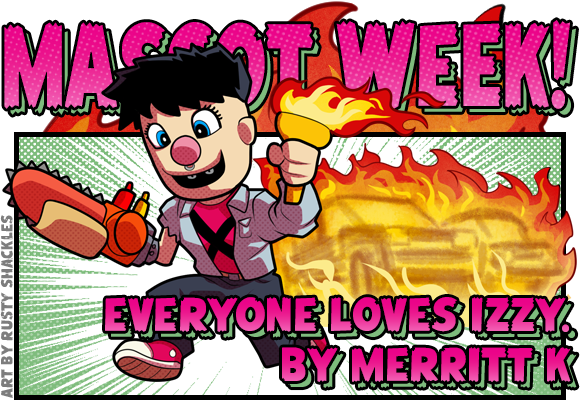
What are the Olympics? Are they a celebration of the highest peaks of human achievement in athletics, a reminder of what dedication and hard work can achieve, a venue for friendly competition between the nations of the world? Or are they a corrupt institution whose visitations upon their host cities leave naught but ruin in their wake, an excuse for the freak outliers of human physical ability to fuck each other senseless every few years at the taxpayer’s expense? They’re all of those things, but more than that, they are one of our primary sources of new mascots.
Olympic mascots began simply. In 1968, Grenoble’s “Shuss” was created in a single night. He is a little man on skis with Olympic rings painted on his head. That was good enough in the ’60s, when mascot tech was still very much in its infancy.
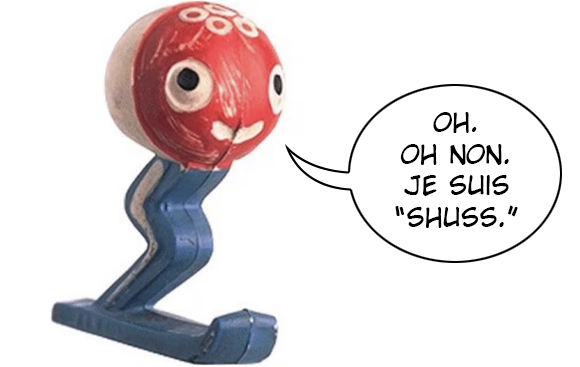
Later mascots were mostly based on animals native to the host country of each year’s games. Sarajevo got a wolf, LA had an eagle, and, ten years ago, Sochi gave us a trio of creatures including a rabbit with oddly sensual eyes.
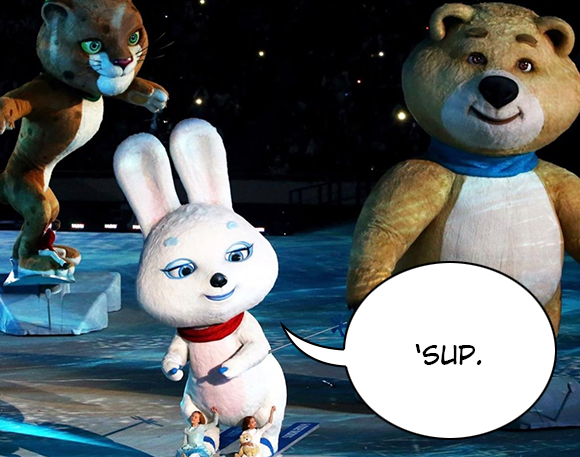
But, in an inverse of the classic Air Bud setup, there’s no rule that says an Olympic mascot has to be a dog, or a bear, or even a sexy rabbit with children strapped to her feet. An Olympic mascot can be anything. It can even be nothing. It can even be Izzy. God help us, it can even be Izzy.
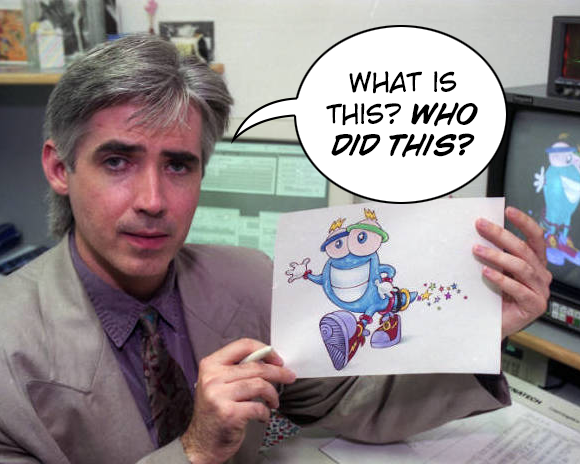
Created by John Ryan of Atlanta firm DESIGNfx, Izzy was originally known as “Whatizit.” He was revealed to the world during the closing ceremony of the 1992 Barcelona games with computer-generated visuals, in what must have seemed to contemporary audiences to be as real and frightening as a train pulling into a station was to audiences in 1895, the dumb assholes.
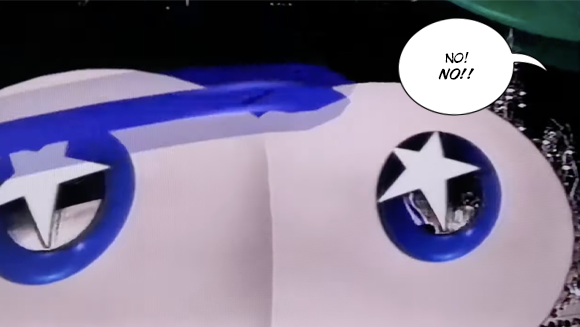
“Now you’re probably wondering who that is,” one of the announcers says.
“What is it?” Another replies.
“Exactly.”
Yes, Whatizit’s introduction was a half-hearted “who’s on first” routine over footage of a costumed version of the character dancing to jazz music.
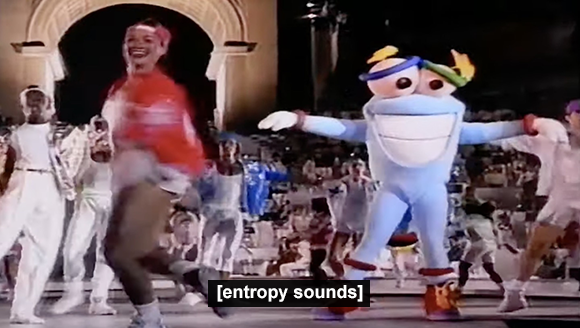
The commentators are barely even feigning interest or pleasure in this abomination. And who can blame them? It’s the end of a grueling Olympic summer and they probably just wanted to go home, but first they had to pretend to an audience of millions that this thing wasn’t a crime against god.
“It’s certainly different,” one says. “I wonder what the other suggestions were,” another adds. “I guess we should give some credit to the man that submitted the winning entry,” they finally concede. All of this is polite television broadcaster speak for “I hate and fear this creature on a pre-rational level, and should I happen to find myself alone with it my body would bludgeon it to death with no conscious action on my part.”
Everyone hated the Whatizit, but Atlanta was bound by Olympic law and the fact they’d probably spent a lot of money on Whatizit-branded merchandise already. They did the only thing they could do: they solicited suggestions from the pure hearts of children to imbue this godless being with a soul.
Whatizit was renamed Izzy. He grew a nose and eyelids and a vast, dark void within his maw, replacing his grim, toothy smile. He went from this:
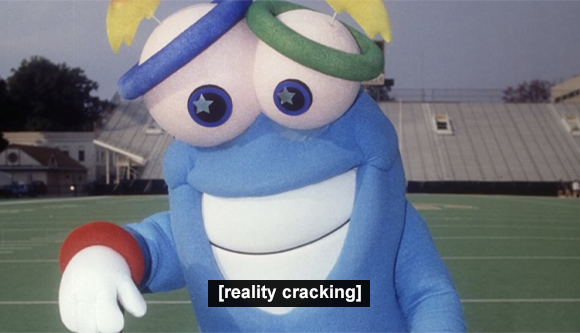
To this:
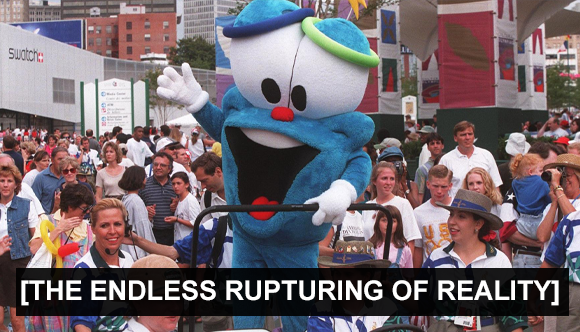
Is this an improvement? Well, let me ask you this: did Newt Gingrich ever shake hands with the Whatizit before he was Izzy?
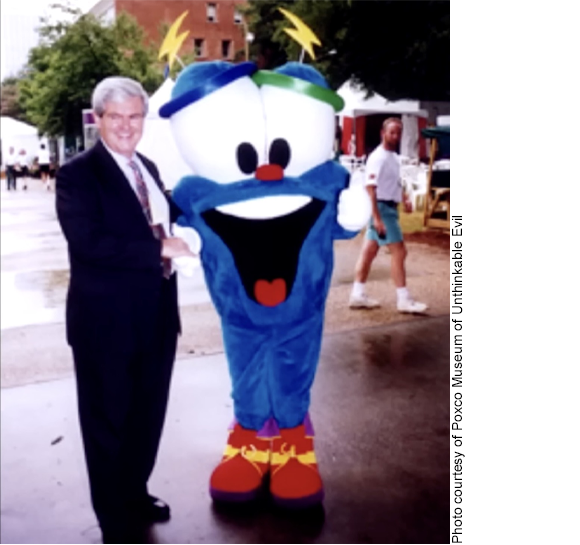
After his glow-up, Izzy started showing up everywhere: merchandise, video games, even a thirty-minute cartoon in 1995. For years, this cartoon was thought to be “lost media,” an oddly impactful phrase to apply to an animated special about an Olympics-obsessed sneaker-wearing mutant. But unlike the Library of Alexandria or a kind of creepy commercial for a Manila flower shop featuring an Enya song, Izzy’s Quest for Olympic Gold was rescued and restored to humanity’s common store of knowledge when someone discovered it on a VHS tape in their dad’s garage in 2020.
This was no fly-by-night cash-in, either. The voice cast features Tress MacNeille, Rob Paulsen, and Jim Cummings — that’s two of the Animaniacs plus 50% of CatDog. The animation is passable, too. But what kind of story do you tell about an amorphous blue merchandising opportunity designed by committee to represent the spirit of the Olympic games? I’m glad you asked!
First, we need to talk about parallel universes. See, within the Olympic torch there resides another world whose inhabitants are responsible for keeping the spirit of the games alive during the years when there are no Olympics scheduled. This realm is called “The Torchworld” and is always referred to with the definite article. The creatures who live there are known only as “citizens of The Torchworld.” Do they know about the existence of the earthrealm, where the Olympics take place? They do. It’s on their TV news.
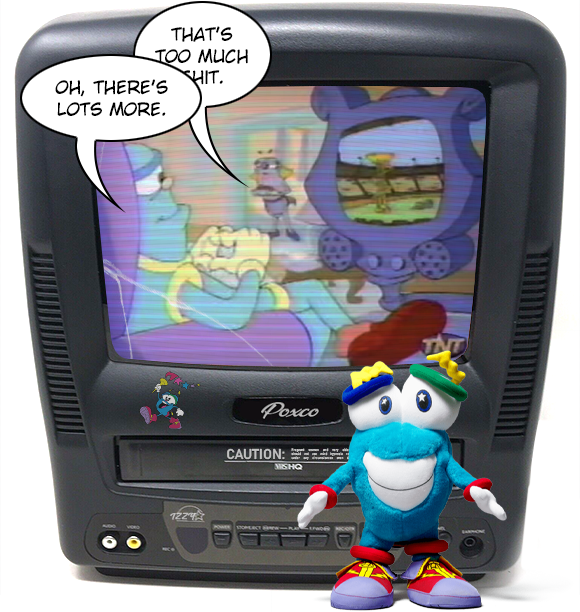
Do they crave to transcend their role as mere vessels for the Olympic spirit and to seize the glory of the games for themselves? At least one does, and his name is Izzy.
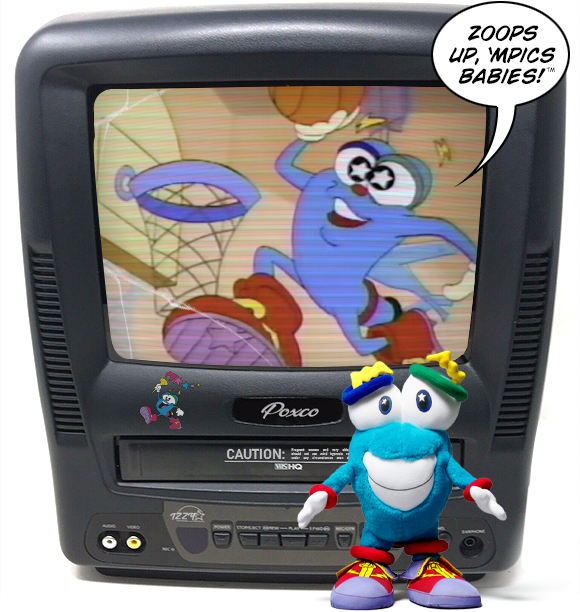
Of course, we wouldn’t have a story if it were as simple as that. And so, Izzy’s father — and nearly every other character introduced after him — tells Izzy that citizens of The Torchworld do not participate in the Olympics in “the world above.” It simply isn’t done. And that kind of makes sense, because if Izzy is any indication then The Torchworldians seem capable of feats of transformation that would likely give them an unfair advantage against beings constrained by the laws of physics and biology.
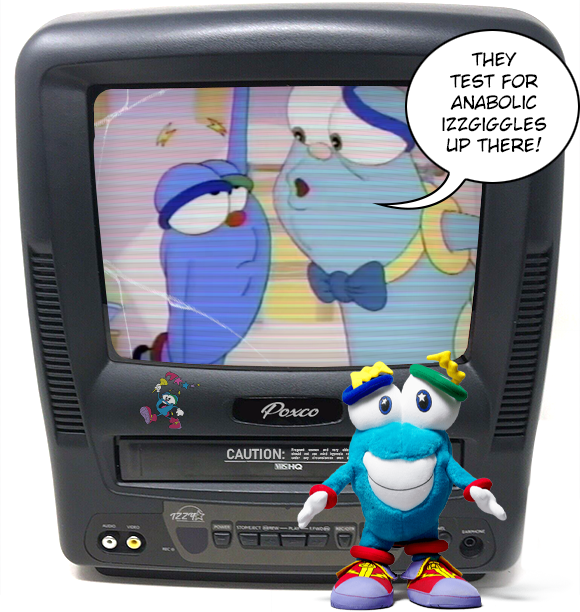
But Izzy is undeterred. He’s going to the surface world. He will bear the ridicule of his people. He will teach the world above the meaning of the Olympics, and also fear.
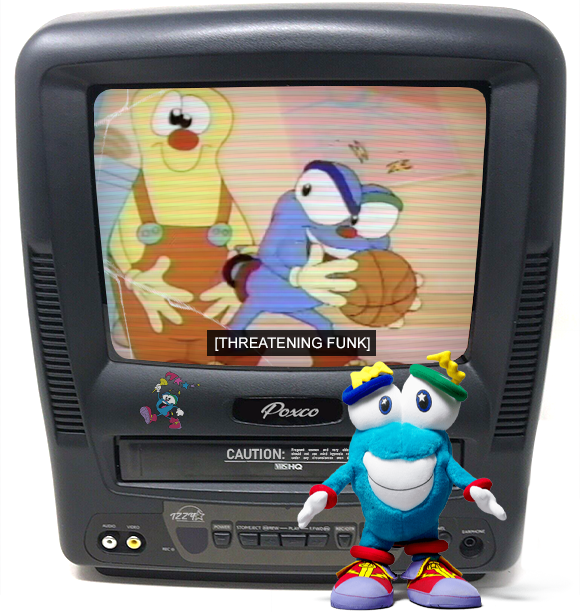
A couple of jocks — except, they aren’t jocks, because in this world jocks are apparently marginalized and ridiculed — mock Izzy for his interest in sporting. “Izzy the great athlete,” they call him, with the same dismissive bile a child in the 1995 world above might call him a homophobic slur. Izzy’s quick on the response, though. “And what about you, Martin?” he asks, “Are you an athlete too? Or just an athletic supporter?”

If you, like me, weren’t sure what that’s supposed to mean, Izzy called that kid a jockstrap. Which is arguably closer to a real-life anti-gay joke than the thing Martin said about him being an athlete. Also, Martin is just called Martin so that his name can rhyme with Spartan, who is his huge, dim-witted brother. Spartans are kind of Greek, right? And the Greeks invented the Olympics? Spartan is drowning, by the way.
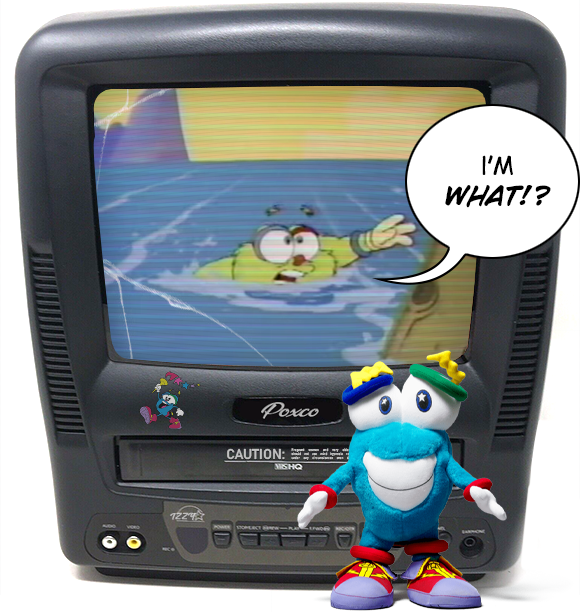
Thankfully, Izzy paddles a log down the river to rescue him. Izzy is a “real hero” for his feat, which has less than nothing to do with his actual goal. Olympic athletes may be a lot of things, but they aren’t heroes, really — well, except for the time Michael Phelps took that huge bong rip.
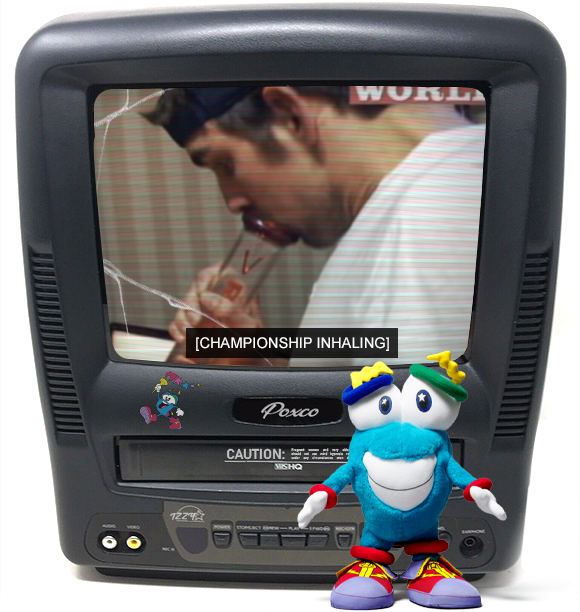
The Tribunal of Elders wishes to give Izzy a hero’s reward for saving Spartan, because of course there’s a Tribunal of Elders in The Torchworld. While waiting for them, he meets Cariba, a sort of proto-Izzy who was apparently at the first Olympic games and constantly quotes historical people who were involved with the Olympics in a desperate bid to make this whole thing kind of educational.
Cariba being at the first Olympics raises a few questions: did The Torchworld always exist, waiting for thousands of years for humanity to invent the Olympics? Or did it spring into existence at the founding of the games in 776? What was it like in The Torchworld during the centuries between the end of the ancient games and the founding of the modern ones? That was the Age of Silence, and while the scars of that era show in her eyes, Cariba does not speak of it.
Instead, she tells Izzy that if he wants to participate in the Olympic games, he’ll need the permission of the Tribunal.
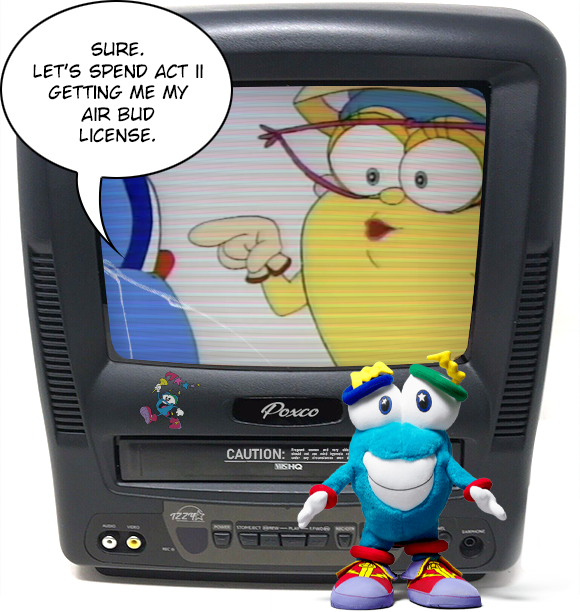
They agree to do so, but there’s a catch: Izzy first needs to collect the five Olympic rings, which stand for perseverance, integrity, sportsmanship, excellence, and brotherhood. You might assume, like I did, that this is actual Olympic lore. In fact, the rings “represent the five parts of the world now won over to Olympism, ready to accept its fruitful rivalries” according to Pierre de Coubertin, co-founder of the modern games. If you resurrected de Coubertin to show him Izzy, would he be aghast or delighted? Probably both, and a little aroused.
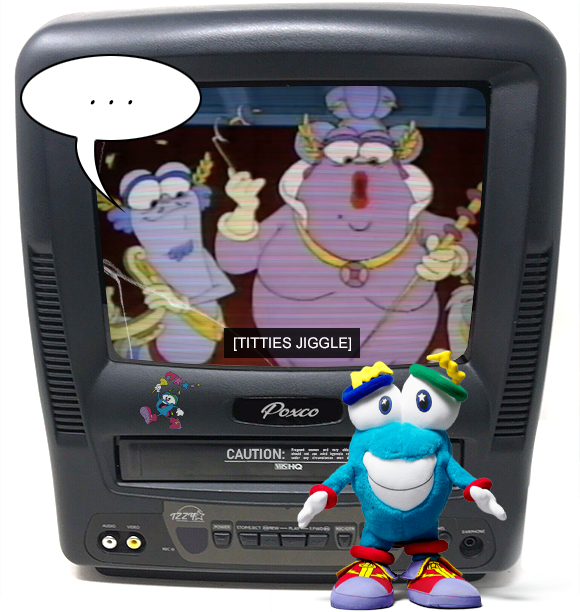
Izzy gets the ring of perseverance immediately upon repeating his intention to go to the Olympics, which is kind of like winning a prize for saying “sure, I’ll take a bong rip” when you’re offered one.
Seeking advice about how to proceed, Izzy visits his now-mentor Cariba. She asks him about his best sport, and he says all of them. His favorite sport? Also all of them. His ambitions are limitless. No human athlete is safe.
Also, Cariba is surprised to see him transform into various pieces of sporting equipment, which — hold on — isn’t something everyone from The Torchworld can do? That’s just a mutant power possessed by one particular guy?

Well, it kind of explains why Izzy is so obsessed with sports, at least. Or maybe the ability is an outer manifestation of his inner dedication to the athletic arts? Regardless, he muses that it would make things easier for him in the Olympics — but again, hold on, would it? If you’re in the middle of a basketball game and turn into a basketball, I can see how that’d be a great way to get to second base with Charles Barkley, but how does it help you win?
None of this makes any sense. It’s almost like whoever was in charge of writing this script was given a picture of a freakish blue blob and the word “Olympics” and told to come up with something by the end of the day or they’d be busted back down to writing one of the less-beloved Animaniacs segments, like that one about the cranky squirrel. Anyway, none of that matters, because Cariba tells him that using his morphing powers would be cheating.
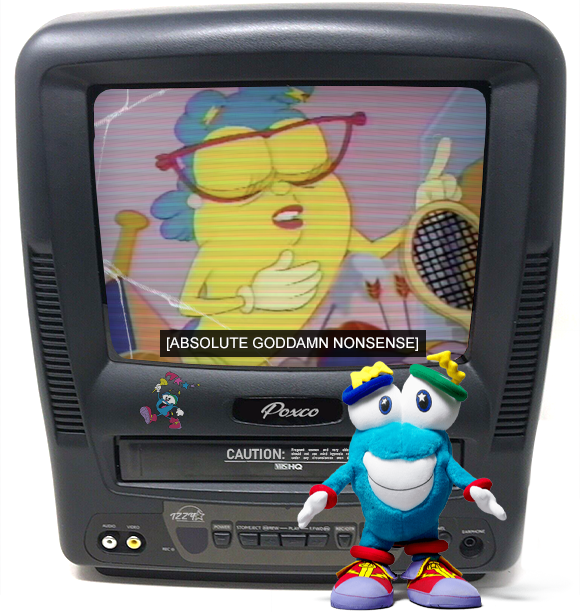
Interesting! Are we setting up a moral dilemma where Izzy has to choose between winning through illicit means and taking a loss?
Kind of? But it doesn’t have anything to do with Izzy’s powers. Instead, Martin and Spartan try to sabotage him in the big bike race by pushing him off a fucking cliff. Didn’t they think he was a hero earlier because he saved Spartan’s life? Look on how kindness and self-sacrifice is repaid, children.
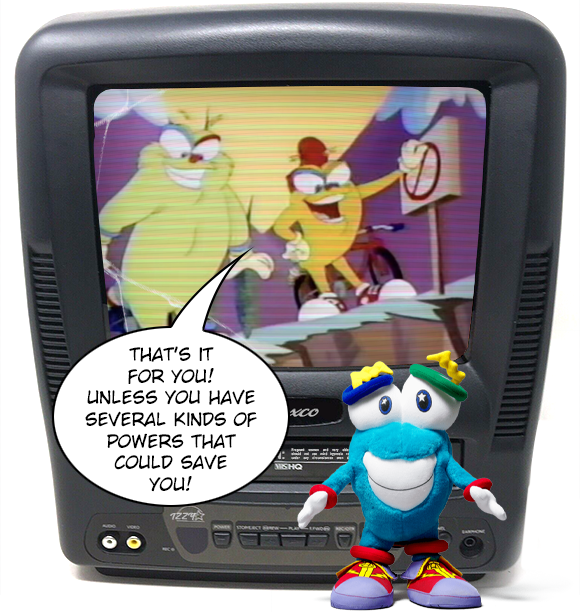
But Izzy survives and makes it to the finish line way before anyone else, winning the race. He tells the truth — leaving out the part where two children tried to murder him — and gets the ring of integrity.
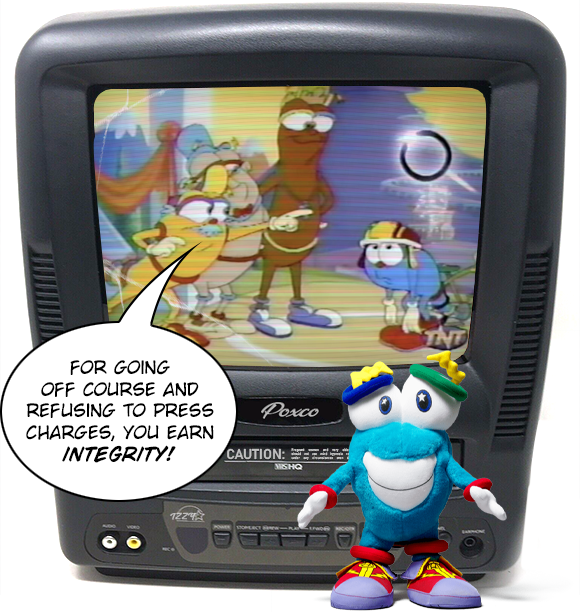
The rest of the special is Izzy winning various events while Martin and Spartan try to stop him, apparently having made it their mission in life to cripple his body and dreams. They have some vague notion that if Izzy gets all of the rings and enters the Olympics, then The Torchworld will explode, but really they’re only doing it because we need antagonists and forgot to set up any real ones in the first act.
But maybe they’re onto something — Izzy’s quest is tearing The Torchworld apart, if not literally then politically. The population has split into pro- and anti-Izzy camps. Somehow, Izzy’s desire to participate in the Olympics has introduced partisan politics and sectarian violence into the peaceful realm of The Torchworld.

Entering a multi-sport competition against his now-rival Spartan, Izzy gets the ring of sportsmanship for accepting an obviously biased score from Martin, who has donned drag to take the place of a judge in the gymnastics competition. You know, people say we’ve made a lot of social progress in the past thirty years, but if this plot point aired today it would be the subject of multiple New York Times opinion pieces about transgenders infiltrating Olympic judging.
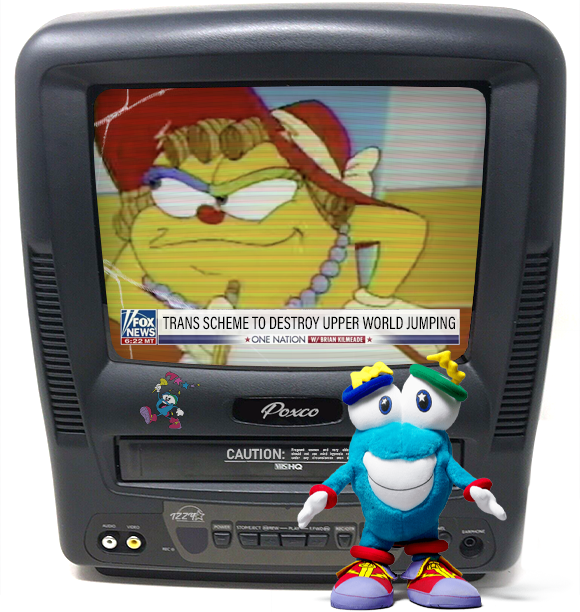
Izzy gets the ring of excellence for doing hurdles good, even after Martin jacks one of the hurdles way up in plain sight of the crowd. That’s four out of five. We’ve reached the climax, and Martin and Spartan’s concerns about Izzy’s ambitions rending the world apart are starting to be realized.
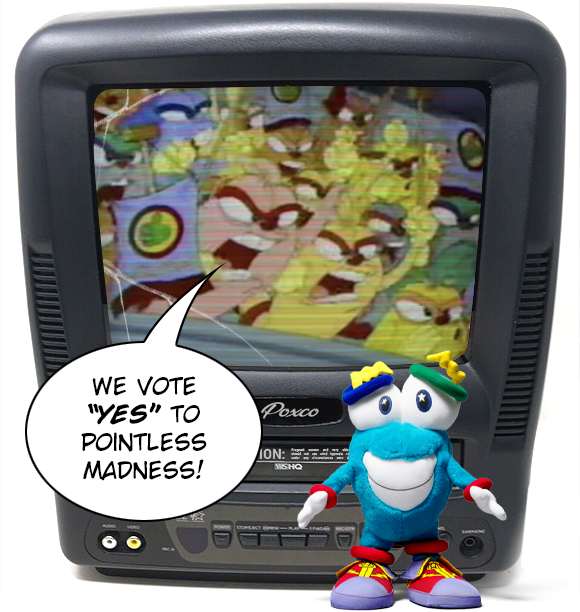
Black clouds descend over The Torchworld, snuffing out the Olympic flame. The citizens erupt into feral madness, cursing and snarling at those whom they once called friends and brothers. We have left behind the premise of a semi-educational cartoon about the Olympics and are now in the opening cinematic of a Dark Souls game.
Izzy faces off against Spartan in a game of one-on-one basketball to determine the fate of the world. But he refuses the role destiny has set out for him. He says he doesn’t want to play, conceding that his dream isn’t worth it if its realization plunges The Torchworld into an Age of Darkness.
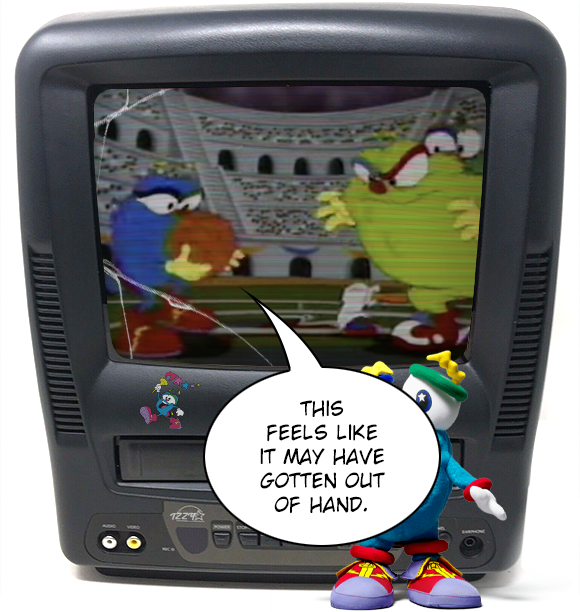
For this, he obtains the final ring — the ring of brotherhood. His quest is complete, and balance is restored to The Torchworld. Izzy will be permitted to ascend to the world above to try out for the human Olympics.
Cariba notes that he will have to get his morphing under control before he goes anywhere, as if the existence of a blue sports monster would be acceptable to the denizens of earth but a shapeshifting blue sports monster would be shunned and hunted as a matter of course.

So, did Izzy try out for the Olympics and succeed? What country did he pledge his allegiance to? Did he turn into a basketball, and if so, did Charles Barkley find a mouth on that basketball? Well, as Cariba playfully tells us, that’s another story.
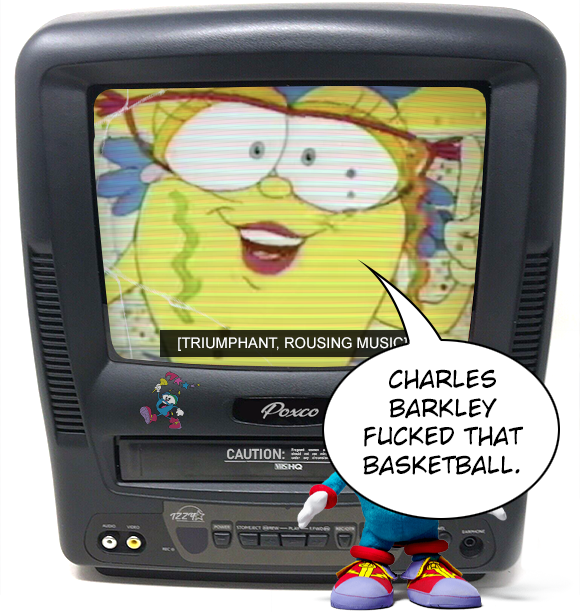
Motherfucker, that’s the story I want to hear about! I guess we’re meant to assume that Izzy was barred from competing after he punched a Cuban boxer’s head off with his prodigious (The) Torchworld strength.
That’s it for Izzy’s Quest for the Olympic Gold. Now, I want to leave you with two quotes about Izzy, the little Olympic mascot that brought more shame to Atlanta than Michael Vick in 2007. The first is from Time Magazine, which referred to Izzy as a “sperm in sneakers.” Which might explain this second quote from Next Generation magazine that said the Genesis version of Izzy’s Quest for the Olympic Rings “leaves a bad taste in your mouth.” That pretty much says it all.
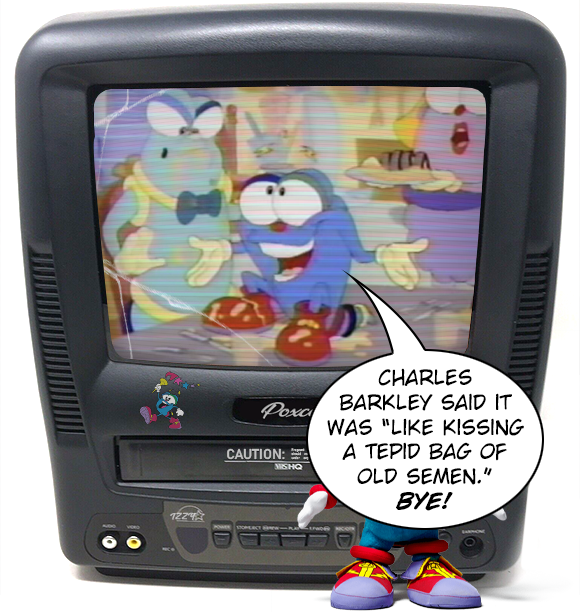

This article was brought to you by our fine sponsor and Hot Dog Supreme: Bim Talzer, the amorphous spirit of the Karate World Championship who can turn into any mat!

One reply on “Mascot Week: Izzy’s Quest for Olympic Gold”
While this article makes a good argument for how sports destroys societies, it also seeds its own counter. While biology assured that dolphin boy Michael Phelps would have a significantly larger than average lung capacity, it is sports which pushed him to maximise their efficiency. I did the calculations and the math suggests that Phelps huffed jungles in that one rip, presumably using a magically refilling bowl.